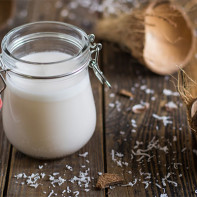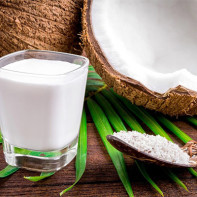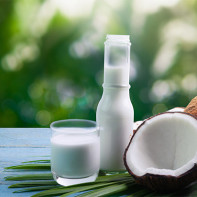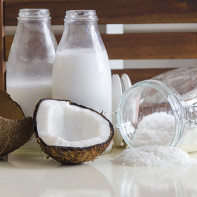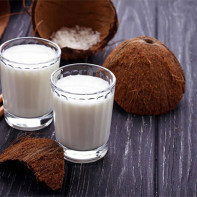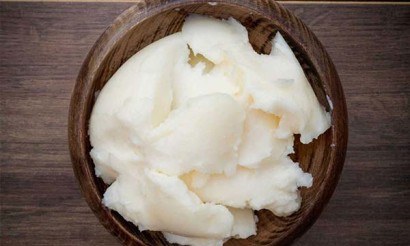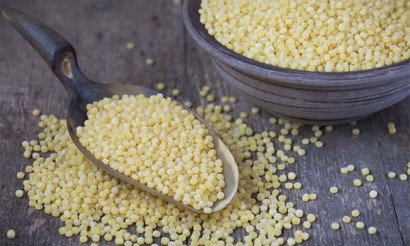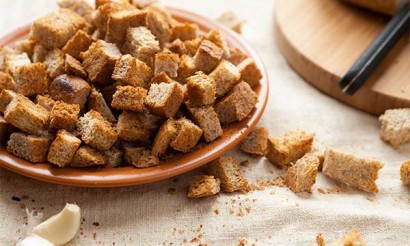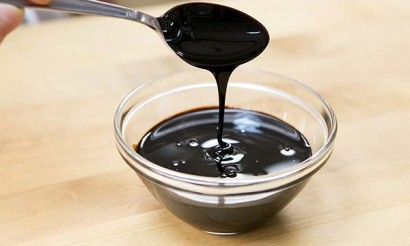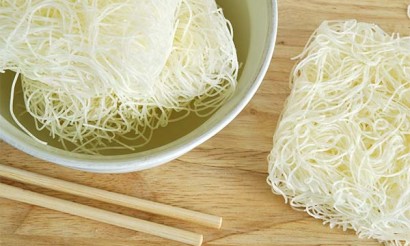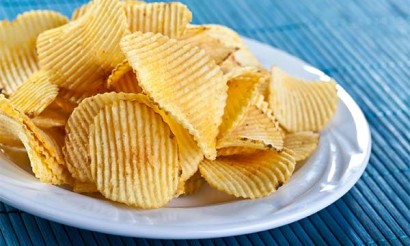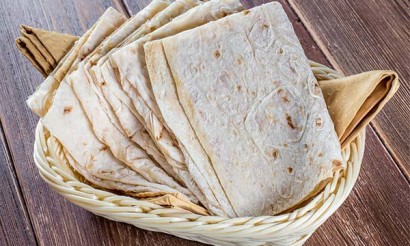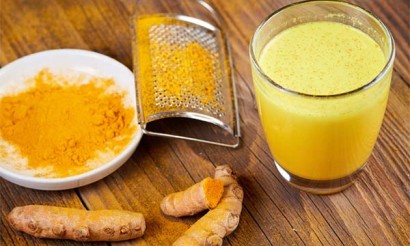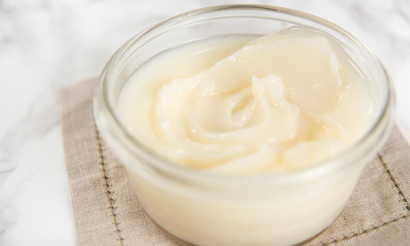Coconut milk: health properties and contraindications
Coconut milk is a sweetish liquid of milky white color, which is produced from the pulp of ripe coconuts.
- How coconut milk differs from coconut water
- Composition and calories
- What coconut milk does for you
- General benefits
- For Women
- For Men
- Pregnancy
- For breastfeeding
- For children
- Coconut milk for weight loss
- Coconut milk in medicine
- For pancreatitis
- For gastritis
- For bowel
- For constipation
- Coconut milk in cosmetology
- Hair Masks with Coconut Milk
- Face Masks
- Is dried coconut milk useful
- How to Dilute Dry Coconut Milk
- Hazards and contraindications
- Can coconut milk be allergic to coconut milk?
- How to choose and store coconut milk
- Can I Freeze?
- How to make coconut milk at home
- How much coconut milk you can drink per day?
- Can I add it to my coffee?
- What can be made with coconut milk: Recipes
- Soup
- Pancakes
- Porridge
- Dessert with Coconut Milk and Chia Seeds
- Coconut Milk Cream
- Yogurt
- What to Substitute for Coconut Milk
- Interesting facts about coconut
How coconut milk is different from coconut water
Coconut water is the juice that is inside the fruit, while coconut milk is the liquid resulting from grinding the pulp of the coconut. The pulp and juice have significant differences when it comes to their composition. The main difference in milk is that this product is rich in saturated fatty acids.
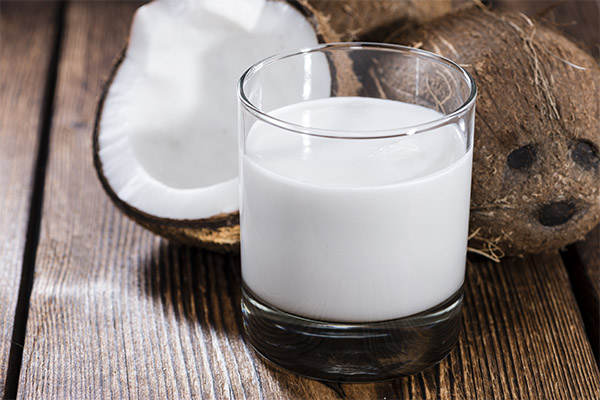
One glass (200 ml) of milk contains 500 kcal (a quarter of the daily human allowance) and 48 g of fats. Milk has a pleasant taste, but it is considered a relatively harmful product. Coconut water is healthier in this respect, as it contains only 0.2 g of fat (per 100 ml). In addition, it is less caloric, since it contains only 45 kcal, most of which are carbohydrates.
Composition and calories
In 100 g of the product contains:
- calories - 230 kcal;
- carbohydrates - 5.5 g;
- protein - 2.3 g;
- fats - 23.8 g;
- saturated fats - 21,1 g
- monounsaturated fats - 1,0 g;
- multivitamin fat - 0.3 g;
- dietary fiber - 2.2 g
- sugar - 3,3 g;
- vitamin C - 2.8 mg;
- folic acid - 16 mcg;
- calcium - 16 mg;
- iron - 1,6 mg;
- magnesium - 37 mg;
- phosphorus - 100 mg;
- potassium - 263 mg;
- sodium - 15 mg;
- zinc - 0.7 mg;
- copper - 0.3 mg;
- manganese - 0.9 mg;
- selenium - 6.2 mcg.
What is coconut milk good for?
General benefits
- The presence of anti-infective properties. Coconut milk contains lauric acid, which is very useful for the human body. When ingested, the acid is converted into monolaurin, a substance that has antiviral properties. It helps the body fight infectious diseases such as swine flu, herpes, HIV, measles, hepatitis C. Coconut milk also has antifungal (helps fight intestinal giardia parasites) and antibacterial (kills bacteria helicobacter pylori, staphylococcus aureus, streptococcus agalactiae and others) properties.
- Blood pressure control and stress control. Coconut milk is rich in magnesium. One glass (200 ml) of coconut milk contains 74 mg of magnesium. Magnesium is involved in the dilation of blood vessels, which leads to lower blood pressure. In addition, this mineral has anti-stress properties. Therefore, the consumption of such milk can help the body to cope with an unstable emotional state, as well as reduce the impact of stressful situations on the human nervous system.
- Fighting cholesterol. Despite its relatively high saturated fat content, coconut milk can actually help reduce cholesterol. It can have an effect on raising total cholesterol levels, and the lauric acid it contains works pinpoint and helps raise only HDL (good cholesterol) levels - this improves the HDL/LDL ratio. In addition, coconut milk contains essential fatty acids - omega-3 and omega-6.
- Bone benefits. Unlike cow's milk, coconut milk does not contain much calcium. But it is worth noting that coconut milk is especially rich in phosphorus. One glass of the product contains about 200-230 mg of phosphorus, so this milk is very useful for bones, as it promotes the development and strengthening of bone tissue.
- Hypoglycemic properties. Coconut milk is an excellent source of manganese: 0.9 mg per 100 grams of product. Manganese is a mineral that plays an important role in regulating blood sugar levels, which is an added benefit for people with type 2 diabetes. Manganese is also important for metabolic function, is involved in the treatment of various inflammations, and may also be useful for the prevention of osteoporosis and the relief of premenstrual syndrome symptoms in women.
- Help in the treatment of arthritis. Coconut milk contains selenium, an antioxidant that relieves arthritis symptoms. Selenium controls free radicals and reduces the risk of joint inflammation.
- Skin benefits. Both when milk is ingested and when the product is applied directly to the skin, its beneficial effects can be noticed. Milk helps the body control the moisture level of the skin and keeps it supple and smooth. Coconut contains high levels of vitamin E, essential for healthy skin.
- Anti-aging properties. Coconut milk is a natural anti-aging agent due to its copper and vitamin C content. These substances help the body retain skin elasticity and elasticity, support vascular function, which helps to slow down the aging process of the skin and prevents the premature appearance of wrinkles.
- No allergens. Coconut milk contains no common allergens or substances that cause intolerance - soy, nuts and lactose. People with lactose intolerance or nut allergies can use coconut milk instead of cow's milk as a safe alternative.
- Cardiovascular Health. Iron, the mineral responsible for oxygenating red blood cells, helps strengthen the cardiovascular system. The copper content of coconut milk increases the absorption of iron and promotes the formation of red blood cells.
- Benefits to the heart. Milk is high in lauric acid, a medium chain fatty acid that has a positive effect on lipid and cholesterol levels in the body. In one study, it was found that when such milk is consumed, "bad cholesterol" (LDL) levels are significantly reduced and "good cholesterol" (HDL) levels are increased. Therefore, the consumption of coconut milk is beneficial for heart health.
- Strengthening the immune system. Coconut milk is high in vitamin C, a nutrient that helps strengthen the immune system.
- Preventing Alzheimer's disease. As we already know, coconut milk contains medium chain length triglycerides (MLCs). These MTCs are easily digested by the liver and converted to ketones. Ketones are considered an alternative source of energy for the brain, so they are very helpful for people with Alzheimer's disease.
- Help to prevent the development of anemia. Anemia is a common condition that is often caused by a lack of nutrients, namely iron, in the body. But this can be avoided by drinking coconut milk regularly. A glass of milk provides the body with almost a quarter of the recommended daily dose of iron. Consuming milk will also help prevent the feeling of fatigue associated with anemia.
- Establishing proper blood circulation. Coconut milk is high in copper and vitamin C. Therefore, consuming this product will help the body ensure normal blood flow and minimize fluctuations in blood pressure.
- Preventing the development of stomach ulcers. For people who suffer from stomach ulcers, drinking this milk can help significantly reduce and even prevent the occurrence of new ulcers. Coconut milk has antiulcer and antibacterial properties. Consuming one glass of coconut milk once a week will significantly reduce the activity of harmful bacteria that causes such diseases.
- Prostate Health. Coconut milk is an excellent source of many vitamins and minerals. Among these nutrients is zinc, an element that helps maintain prostate health and reduces the risk of prostate cancer. The prostate gland already contains a small amount of zinc in the soft tissues, but regular consumption of this product ensures the maintenance of the level of the element in the body.
- Increased performance. Coconut contains a lot of natural sugars. These sugars give the body energy, so it is able to work faster. At the same time, the natural sugar contained in milk is absorbed by the body much better than the usual white sugar.
For women.
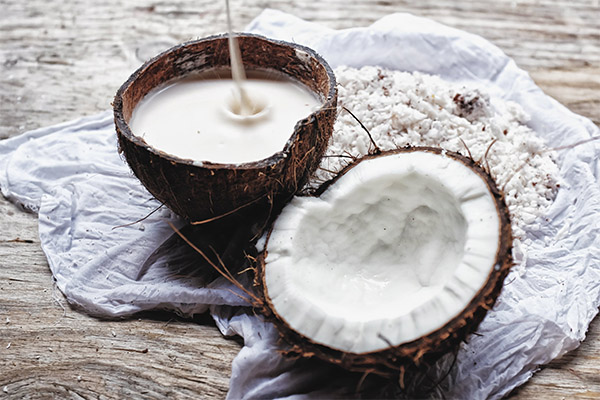
Coconut milk has antimicrobial properties. More importantly, milk is a source of antioxidants that help flush free radicals from the body. Studies show that a diet high in antioxidants helps reduce the risks of cancer, heart disease, Parkinson's disease and Alzheimer's. Regular consumption of milk can also be beneficial for gallbladder disease and kidney stones. Because coconut milk is rich in electrolytes, proteins and carbohydrates, it is a great way to boost energy in the morning, especially during menstruation.
For Men
Milk is also very good for the male body. This product contains substances that help keep men's health in check. Coconut milk is an excellent prophylactic against prostatitis. It helps to improve potency and reproductive functions. In addition, the protein contained in milk helps men who are engaged in sports to build muscles and energize them during workouts.
Pregnancy.
Any coconut products, including milk, can be consumed by pregnant women. Coconut improves the immune system and increases the ability to fight disease. The fatty acids contribute significantly to the development of the fetus. Lauric acid helps increase the amount of breast milk and reduces the risk of joint pain. Coconut oil also contains a lot of vitamin E, which is good for baby's growth and development.
Milk is only useful if consumed in moderation. It is allowed to drink up to 2 glasses per week with a few days break.
When breastfeeding.
Coconut milk is also useful during breastfeeding. It helps the body produce the hormones needed to produce its own milk. The fatty acids found in coconut are part of the composition of breast milk. It contains monolaurin, a fat that stimulates the growth of brain cells, and lauric acid, which helps strengthen the immune system of both mother and baby.
It is not recommended to drink milk if the baby has allergic reactions, or if the breastfeeding woman has kidney or digestive problems. It is allowed to start drinking milk 3 months after childbirth, but in small portions. Gradually, the doses can be increased, the maximum volume per day is 100 ml.
For kids
As a rule, coconut milk is included in the diet of children who are intolerant to cow's milk. But this product does not give much effect, since you can use it only in small quantities, a maximum of 2 times a week.
The recommended age at which a child can be given products based on coconut is 2-3 years. If there are no allergic reactions, no digestive problems, you can gradually start to include diluted milk, when the baby is 1 year old. Be sure to consult with your pediatrician before doing this.
At the first appointment, you should dilute the milk with water 50/50 and give the child no more than one teaspoon. If allergies occur, it is necessary to exclude the product from the diet and consult a doctor.
Coconut milk for weight loss
Since coconut milk contains saturated fats, people on a diet often exclude this product from their diet. Nevertheless, coconut milk has properties that may help in losing excess weight. The fiber contained in it contributes to quick satiety, so after drinking one glass of the drink your appetite can be significantly reduced, which will undoubtedly affect your weight.
The fat contained in milk is involved in metabolic processes and helps to speed up metabolism. The product also contains medium chain triglycerides, which are known to be able to burn fat, causing a feeling of satiety.
Coconut milk in medicine
In its native land, coconut milk is used as a remedy to help treat poisoning and diarrhea. Also, until recently, coconut was believed to be a cure for cholera. Oriental medicine is of the opinion that the consumption of coconut milk contributes significantly to improving the functioning of the cardiovascular system, normalizing blood circulation, lowering bad cholesterol levels, as well as minimizing the risk of atherosclerosis.
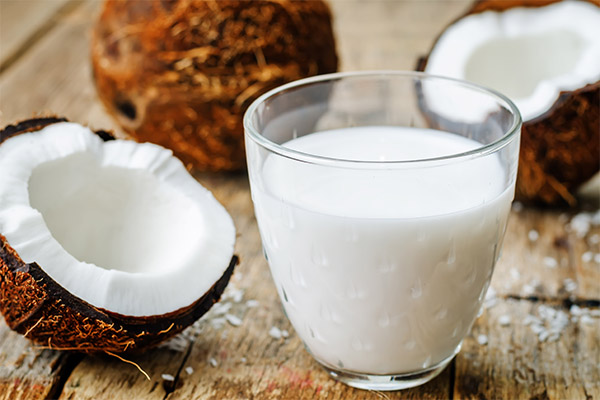
For Diabetes.
Coconut milk does not contain sugar, fructose gives it sweetness, so this product is allowed to include in the diet of people suffering from diabetes. Moreover, it is worth noting that milk contains manganese, so its consumption leads to a reduction in the amount of sugar in the blood.
Important: The glycemic index of coconut milk is 40 units.
For pancreatitis.
In the course of the disease in a mild form of coconut milk is allowed to use, but only in reasonable quantities. If you go overboard with the dosage, it can overload the pancreas, and this will cause harm to the body. When drinking milk in moderation, the body will be easier to cope with the disease, because the product has properties that normalize digestion, as well as a beneficial effect on the pancreas. If the disease runs in an acute form, it is forbidden to use coconut milk.
If you have gastritis
With gastritis, it is allowed to consume coconut milk, but, again, in small quantities. The acids in this product are very well absorbed, so there is no excessive deposition of fat. Coconut milk should not be consumed if you are intolerant to fructose or food allergies.
For the intestines
Coconut milk contains fiber, which has a positive effect on the intestinal process. Therefore, all unnecessary components will be eliminated from the body much easier. Fibers themselves are well-digested, so they will not burden the body additionally.
For constipation
Milk contains a wide range of vitamins and minerals. The body is saturated with essential electrolytes and healthy fats that help food move normally through the digestive tract and excrete feces regularly, so it is very useful for constipation.
Coconut milk in cosmetology
Coconut milk is a universal product for skin beauty. If you learn how to use it properly, the process of maintaining youthful and healthy skin can be turned into one pleasure.
Hair Masks with Coconut Milk
Mask with pure coconut milk
What you need:
- Coconut milk - 1/4 cup;
- A shower cap.
How to make:
- Warm up the milk.
- Massage and rub into the scalp (the process should take 10-15 minutes).
- After that, lubricate the hair with milk (along the entire length) and put on a cap.
- Wait 40-45 minutes.
- Wash your head with regular shampoo.
It is recommended to do the mask once a week, so the scalp will receive nutrition and improve the structure of the hair.
Mask with coconut milk and honey
What you need:
- Coconut milk - 4 tbsp;
- honey - 2 tsp;
- shower cap.
How to prepare:
- Mix the milk with honey (until a homogeneous consistency).
- Massaging, apply the mask to the scalp.
- After that, lubricate the hair with milk (along the entire length) and put a cap on.
- Wait 60-120 minutes.
- Wash your head with regular shampoo.
Mask helps to moisturize the hair. The procedure can be performed once a week.
Face Masks
Moisturizing face mask
Ingredients:
- coconut milk - 1 tsp;
- Honey - 1 tsp.
How to prepare:
- Mix milk and honey and apply this mixture to the face (using a cosmetic spatula).
- Wait for 15 minutes.
- Wash off the mask with warm water.
Coconut milk promotes the disappearance of pimples, reduces irritation and inflammation.
Moisturizing face mask
Ingredients:
- coconut milk - 1/2 tbsp;
- yogurt (without additives) - 1 tbsp;
- honey - 1 tsp;
- rice flour (grinded) - 1 tsp.
How to make:
- Combine ingredients and mix thoroughly.
- Apply the mixture on a cleaned and steamed skin.
- Wait 20-30 minutes.
- Wash your face with warm water.
After the procedure, the skin will be more gentle and well moisturized.
Is dried coconut milk good for you?
Dried coconut milk is made by drying the pulp of coconut. The resulting product has beneficial properties. Dried milk contains iron, magnesium, potassium and other vital elements, which are fully preserved after drying. Consumption of such milk helps to reduce manifestations of seasonal avitaminosis, as well as supports the health of the urinary and nervous systems.
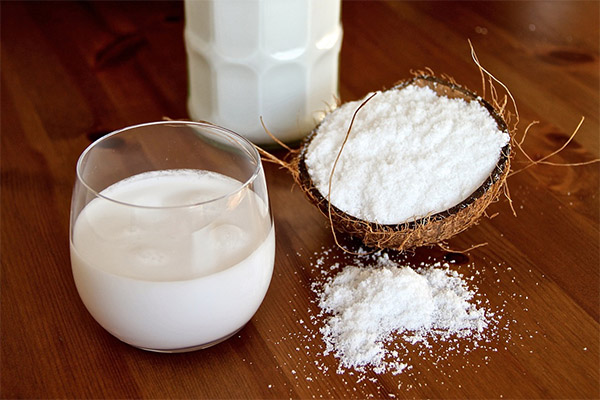
It is quite a low-calorie product, so it can be consumed by people with excessive body weight.
How to dilute dried coconut milk
To dilute it, you will need:
- powdered milk - 5 tsp;
- Water (warm) - 250 ml.
- Place dried milk in a glass.
- Pour warm water (50 ml) and mix thoroughly.
- Add 100 ml of water and whisk the mixture (with a blender for up to 1 minute).
- Then let the milk stand, after settling of foam, pour the remaining water into a glass and stir.
- Wait until the milk has completely settled.
Harms and contraindications
Because of its rich flavor, coconut milk is considered a healthy substitute for many dairy products. But along with its many benefits, it also has some side effects.
Side effects of coconut milk:
- Increased cholesterol. The fats in coconut milk can raise cholesterol levels in the body.
- Allergies and intolerances. If you are allergic to fructose or if you are intolerant to the components of the milk, the drink can be harmful to the body.
- Overweight. Excessive consumption can lead to the deposition of fat in the body.
- Constipation. Because of its high fiber content, coconut milk can cause digestive problems or even constipation.
- Irritable Bowel Syndrome. The monosaccharides and polyols in coconut milk contribute to the risk of irritable bowel syndrome.
In most cases, the side effects occur only with excessive consumption. So limit your consumption to acceptable limits and enjoy the benefits of this amazing drink.
Can you be allergic to coconut milk
Allergies to coconut milk can manifest as itchy mouth, cough, shortness of breath, reddened skin, nausea and vomiting. Allergies to this product can occur even in people who have previously consumed coconut and had no consequences. Most often such reactions occur when milk is applied to the skin.
How to choose and store coconut milk
In order to determine the quality of the product, the first thing to do is to analyze the information on the label. The milk should contain coconut pulp and water. If additional components are indicated, then it is better not to buy such a product. Be sure to pay attention to the fact that the composition did not contain E-224 (carcinogen, which can have a negative impact on human health).
It is recommended to buy milk in a small container, because after opening it can be stored in the refrigerator only 3 days (no more). The product should be stored in an airtight container.
Can you freeze it?
Milk can also be stored frozen, which will keep it longer.
How to make coconut milk at home
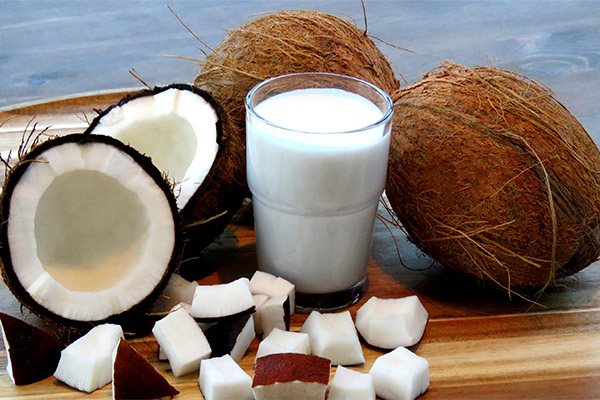
Ingredients:
- coconut - 1 pc;
- water - 400 ml.
- Feel one eye on the coconut, it should be quite soft. It should be pierced and through the resulting hole drain the coconut water.
- Split the coconut (you can do this with a hatchet).
- Free the coconut pulp from the shell.
- Peel the pulp from the dark remnants.
- Grate the pulp with a grater or food processor.
- Pour the powder into a bowl and pour water (boiling) until pulp is completely coated.
- Wait 30 minutes and put the mass on a thick towel, squeeze out the liquid so that the chips are dry. You will get about 130 grams of coconut shavings and 400 grams of coconut milk. A little later you will notice that the resulting milk will divide into two parts. There will be butter on the surface and milk on the bottom.
- Place the milk in the refrigerator for 24 hours.
How much coconut milk you can drink per day
It is not recommended to drink the drink every day. The acceptable dosage is 1 cup per week or half a cup once every 3-4 days.
Can I add it to my coffee
Coconut milk can and should be added to coffee. It will give it a creamy, creamy taste and a light coconut flavor.
What you can make with coconut milk: recipes
Coconut milk has a wide application in the field of cooking. This excellent drink can be used in the preparation of various dishes.
Soup
Ingredients:
- chicken leg - 4 pcs;
- onion - 1 pc;
- carrot - 1 pc;
- garlic - 5 tooth;
- cilantro;
- coconut milk;
- cheese (melted) - 3 pcs;
- potatoes - 2 pcs;
- quail eggs.
How to prepare:
- Put chicken broth to boil.
- Onion and cilantro finely chop, grate carrot and garlic, cut potatoes (sticks) and cheese (cubes).
- After the broth has boiled, put the meat (boneless) into the pot. Add potatoes to the broth.
- In a pan (with butter) gently fry the onion and carrot, add there coconut milk (3 tbsp.), cheese (cubes), and mix.
- Add cilantro and garlic.
- Pour the cheese mixture into the broth, stir, salt and pepper.
Pancakes
Ingredients:
- sugar - 2 tbsp;
- coconut milk - 400-450 ml;
- flour - 8-10 tbsp;
- eggs - 2 pcs;
- oil (olive) - 3 tablespoons;
- coconut shavings - 20 gr;
How to prepare:
- Beat the eggs together with the sugar.
- Add the coconut milk and mix.
- Knead after adding the flour.
- Add the coconut shavings, olive oil and mix.
- Bake the pancakes.
Porridge
Ingredients:
- oat flakes - 100 g;
- coconut milk - 200 ml;
- water - 100 ml;
- honey - 1 tbsp.
How to prepare:
- Pour the milk into a saucepan, dilute it with water and put to boil.
- Once the mixture begins to boil, pour there oat flakes and mix thoroughly.
- Cover the saucepan with a lid, leaving a gap so that steam can escape, also turn down the heat to minimum.
- Stirring, cook for about 5 minutes.
- Set the pot aside (for 10 minutes).
- Transfer the porridge to a bowl, add honey and stir.
Dessert with coconut milk and chia seeds
Ingredients:
- chia seeds - 4 tbsp;
- mango - 1,5 tbsp;
- coconut milk - 0.5 tbsp;
- milk - 0.5 tbsp;
- vanilla - 0,5 tsp;
- sugar - 1 tbsp;
- water - 1 tbsp;
- hazelnut (chopped).
How to prepare:
- Beat with a blender the pulp of the mango, while gradually adding water. Pour 1/3 cup of the mixture and place in the refrigerator for 60 minutes.
- In a separate bowl, mix the cow's milk and coconut milk with the vanilla and sugar, stir, and then add the chia seeds. Stir for 3 to 4 minutes until thickened.
- Fill cups with mango and milk mixture and place in refrigerator for 4-8 hours.
Coconut milk cream
Ingredients:
- The pulp from 1 coconut;
- butter - 70 gr;
- powdered sugar - 40 gr;
- chicken eggs - 2 pcs;
- cream - 100 gr;
- starch - 30 gr;
- vanillin - 1-2 gr.
How to prepare:
- Chill the bowl and whisk (or blender attachment) in the refrigerator (10 minutes).
- Make milk from the pulp of the coconut, for the cream you will need only the sediment (the liquid can be drained).
- Beat a mass (3-4 minutes) of milk, butter, powder, eggs and starch, at the end add the eggs (only the protein).
- Add vanilla and whisk until smooth.
- Once cooked, serve the cream immediately.
Yogurt
- Heat coconut milk (1-2 liters) to 39-40 degrees.
- Add the probiotic bought at the drugstore or 1 cup of ready-made yogurt, and whisk.
- Pour the mixture into a jar and leave for 7-12 hours in a warm place near a radiator or cover the container with a towel.
- Add the vanilla when ready, stir well, and leave to stand in the fridge for another 6 hours.
How to substitute coconut milk
What you can replace the coconut milk with:
- In desserts, with regular milk;
- For sauces, substitute nonfat cream (10 to 15 percent);
- In baked goods, with coconut shavings.
Interesting facts about coconut
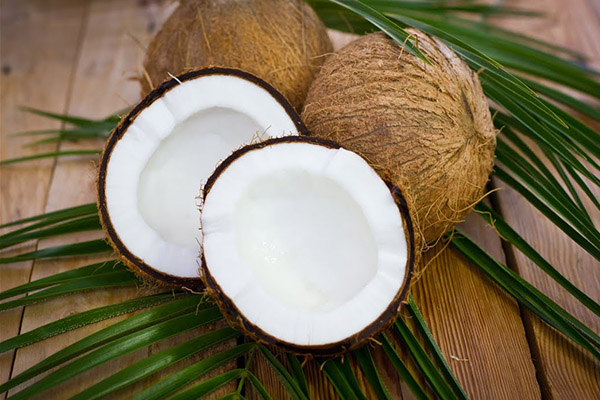
- Falling coconuts kill 150 people every year.
- Coconut oil was the most common coconut oil in the world until the 1960s.
- More than 20 billion coconuts are harvested each year.
- Coconut fruits can swim long distances across the ocean and then germinate on new land when they hit the shore.
- Coconuts have a lifespan of 100 to 120 years.
«Important: All information on this site is provided for informational purposes only. for informational purposes only. Please consult with your health care professional before using any of the recommendations. specialist before using any of the recommendations. Neither the editors nor the authors shall be liable for any possible harm caused by materials."

